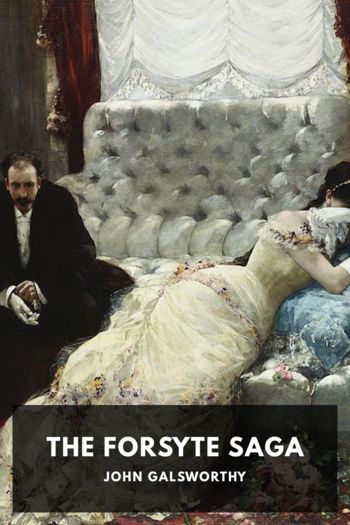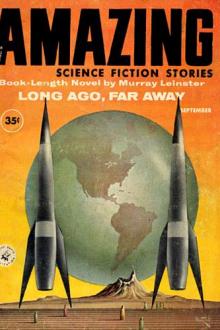The Forsyte Saga - John Galsworthy (best english novels for beginners .txt) 📗

- Author: John Galsworthy
Book online «The Forsyte Saga - John Galsworthy (best english novels for beginners .txt) 📗». Author John Galsworthy
Jon gazed at her enraptured.
“Splendid! I can show it you from the copse, we shan’t meet anybody. There’s a train at four.”
The god of property and his Forsytes great and small, leisured, official, commercial, or professional, like the working classes, still worked their seven hours a day, so that those two of the fourth generation travelled down to Robin Hill in an empty first-class carriage, dusty and sun-warmed, of that too early train. They travelled in blissful silence, holding each other’s hands.
At the station they saw no one except porters, and a villager or two unknown to Jon, and walked out up the lane, which smelled of dust and honeysuckle.
For Jon—sure of her now, and without separation before him—it was a miraculous dawdle, more wonderful than those on the Downs, or along the river Thames. It was love-in-a-mist—one of those illumined pages of Life, where every word and smile, and every light touch they gave each other were as little gold and red and blue butterflies and flowers and birds scrolled in among the text—a happy communing, without afterthought, which lasted thirty-seven minutes. They reached the coppice at the milking hour. Jon would not take her as far as the farmyard; only to where she could see the field leading up to the gardens, and the house beyond. They turned in among the larches, and suddenly, at the winding of the path, came on Irene, sitting on an old log seat.
There are various kinds of shocks: to the vertebrae; to the nerves; to moral sensibility; and, more potent and permanent, to personal dignity. This last was the shock Jon received, coming thus on his mother. He became suddenly conscious that he was doing an indelicate thing. To have brought Fleur down openly—yes! But to sneak her in like this! Consumed with shame, he put on a front as brazen as his nature would permit.
Fleur was smiling, a little defiantly; his mother’s startled face was changing quickly to the impersonal and gracious. It was she who uttered the first words:
“I’m very glad to see you. It was nice of Jon to think of bringing you down to us.”
“We weren’t coming to the house,” Jon blurted out. “I just wanted Fleur to see where I lived.”
His mother said quietly:
“Won’t you come up and have tea?”
Feeling that he had but aggravated his breach of breeding, he heard Fleur answer:
“Thanks very much; I have to get back to dinner. I met Jon by accident, and we thought it would be rather jolly just to see his home.”
How self-possessed she was!
“Of course; but you must have tea. We’ll send you down to the station. My husband will enjoy seeing you.”
The expression of his mother’s eyes, resting on him for a moment, cast Jon down level with the ground—a true worm. Then she led on, and Fleur followed her. He felt like a child, trailing after those two, who were talking so easily about Spain and Wansdon, and the house up there beyond the trees and the grassy slope. He watched the fencing of their eyes, taking each other in—the two beings he loved most in the world.
He could see his father sitting under the oak-tree; and suffered in advance all the loss of caste he must go through in the eyes of that tranquil figure, with his knees crossed, thin, old, and elegant; already he could feel the faint irony which would come into his voice and smile.
“This is Fleur Forsyte, Jolyon; Jon brought her down to see the house. Let’s have tea at once—she has to catch a train. Jon, tell them, dear, and telephone to the Dragon for a car.”
To leave her alone with them was strange, and yet, as no doubt his mother had foreseen, the least of evils at the moment; so he ran up into the house. Now he would not see Fleur alone again—not for a minute, and they had arranged no further meeting! When he returned under cover of the maids and teapots, there was not a trace of awkwardness beneath the tree; it was all within himself, but not the less for that. They were talking of the Gallery off Cork Street.
“We back numbers,” his father was saying, “are awfully anxious to find out why we can’t appreciate the new stuff; you and Jon must tell us.”
“It’s supposed to be satiric, isn’t it?” said Fleur.
He saw his father’s smile.
“Satiric? Oh! I think it’s more than that. What do you say, Jon?”
“I don’t know at all,” stammered Jon. His father’s face had a sudden grimness.
“The young are tired of us, our gods and our ideals. Off with their heads, they say—smash their idols! And let’s get back to—nothing! And, by Jove, they’ve done it! Jon’s a poet. He’ll be going in, too, and stamping on what’s left of us. Property, beauty, sentiment—all smoke. We mustn’t own anything nowadays, not even our feelings. They stand in the way of—Nothing.”
Jon listened, bewildered, almost outraged by his father’s words, behind which he felt a meaning that he could not reach. He didn’t want to stamp on anything!
“Nothing’s the god of today,” continued Jolyon; “we’re back where the Russians were sixty years ago, when they started Nihilism.”
“No, Dad,” cried Jon suddenly, “we only want to live, and we don’t know how, because of the Past—that’s all!”
“By George!” said Jolyon, “that’s profound, Jon. Is it your own? The Past! Old ownerships, old passions, and their aftermath. Let’s have cigarettes.”
Conscious that his mother had lifted her hand to her lips, quickly, as if to hush something, Jon handed the cigarettes. He lighted his father’s and Fleur’s, then one for himself. Had he taken the knock that Val had spoken of? The smoke was blue when he had not puffed, grey when he had; he liked the sensation in his nose, and





Comments (0)